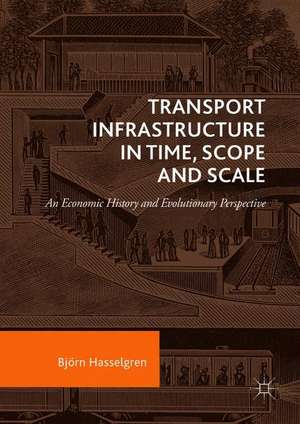Transport Infrastructure in Time, Scope and Scale: An Economic History and Evolutionary Perspective
Autor Björn Hasselgrenen Limba Engleză Hardback – 5 iun 2018
This book discusses the economics of transport infrastructure and the economic theorizing around transport infrastructure from 1850 to today. Transport infrastructure systems are continuously evolving over time. Since the mid-1800s these systems have grown in complexity and outreach. They have been important drivers of economic development but have also been important as economic agents in themselves. Over time transport infrastructure systems have taken on different functions as providers of simpler transport services or more developed value chain components. Transport infrastructure has also been a source for different arguments about economic theory and practice.
Transport infrastructure systems are analysed from an institutional perspective where the long-term development of the ownership and financing of the systems, as well as the connection to different policy areas are elaborated. A longitudinal study of Sweden’s transport infrastructurepolicy is used to exemplify driving factors causing change and transformation of the systems over time with different scale and scope.
| Toate formatele și edițiile | Preț | Express |
|---|---|---|
| Paperback (1) | 718.34 lei 6-8 săpt. | |
| Springer International Publishing – 26 ian 2019 | 718.34 lei 6-8 săpt. | |
| Hardback (1) | 723.38 lei 6-8 săpt. | |
| Springer International Publishing – 5 iun 2018 | 723.38 lei 6-8 săpt. |
Preț: 723.38 lei
Preț vechi: 882.17 lei
-18% Nou
Puncte Express: 1085
Preț estimativ în valută:
138.42€ • 150.83$ • 116.64£
138.42€ • 150.83$ • 116.64£
Carte tipărită la comandă
Livrare economică 23 aprilie-07 mai
Preluare comenzi: 021 569.72.76
Specificații
ISBN-13: 9783319790534
ISBN-10: 3319790536
Pagini: 84
Ilustrații: XV, 121 p. 18 illus.
Dimensiuni: 148 x 210 mm
Greutate: 0.32 kg
Ediția:1st ed. 2018
Editura: Springer International Publishing
Colecția Palgrave Macmillan
Locul publicării:Cham, Switzerland
ISBN-10: 3319790536
Pagini: 84
Ilustrații: XV, 121 p. 18 illus.
Dimensiuni: 148 x 210 mm
Greutate: 0.32 kg
Ediția:1st ed. 2018
Editura: Springer International Publishing
Colecția Palgrave Macmillan
Locul publicării:Cham, Switzerland
Cuprins
Introduction.- 1. Government ownership of roads and railroads – why? 2. Theoretical background.- 3. Economic Theory and Transport Infrastructure.- 4. Planning and Coordination of Transport Infrastructure.- 5. Sweden’s Transport Infrastructure History—Coevolution
and Conflict.- 6. Concluding Remarks.
and Conflict.- 6. Concluding Remarks.
Notă biografică
Björn Hasselgren is a guest researcher in the Economic History Department of Uppsala University, Sweden and has a PhD in planning and decision analysis from KTH Royal Institute of Technology, Sweden. He has extensive experience from senior positions in the transport infrastructure sector and the Sveriges Riksbank.
Textul de pe ultima copertă
This book discusses the economics of transport infrastructure and the economic theorizing around transport infrastructure from 1850 to today. Transport infrastructure systems are continuously evolving over time. Since the mid-1800s these systems have grown in complexity and outreach. They have been important drivers of economic development but have also been important as economic agents in themselves. Over time transport infrastructure systems have taken on different functions as providers of simpler transport services or more developed value chain components. Transport infrastructure has also been a source for different arguments about economic theory and practice.
Transport infrastructure systems are analysed from an institutional perspective where the long-term development of the ownership and financing of the systems, as well as the connection to different policy areas are elaborated. A longitudinal study of Sweden’s transport infrastructurepolicy is used to exemplify driving factors causing change and transformation of the systems over time with different scale and scope.
Caracteristici
Focuses upon the history of economic theorizing around transport infrastructure Uses clear case studies to investigate theory Analyses infrastructure systems from an institutional perspective
